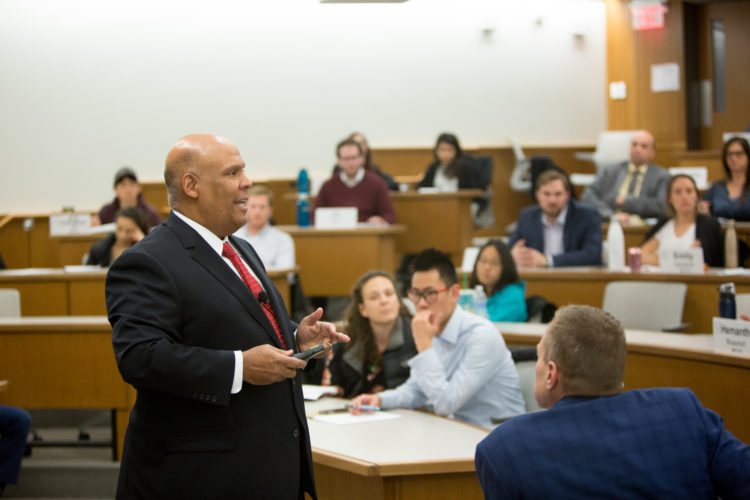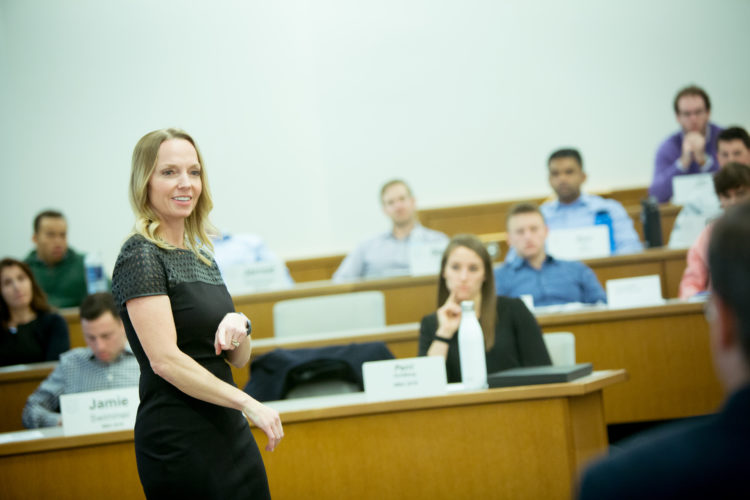What place does religion play in the workplace? How does it inform us as business leaders? Should religion underpin our notions of values, ethics, and leadership in today’s boardrooms and executive suites?
“If we’re in business, we want to make a buck. We serve our own interests—that’s not going to go away,” said former US Sen. John Danforth, who will serve as a panelist during a February 13 symposium, “The Relevance of Religion for Leadership: How Religious Traditions Can Information Leadership Values and Approaches.”
“But is that all there is to it?” said Danforth, a member of the national advisory board for the Danforth Center on Religion and Politics, which is cosponsoring the symposium. “Religion points us beyond ourselves to purpose and commitment beyond taking care of ourselves.”
The idea for an Olin-run symposium on religion and leadership began with an article in The Wall Street Journal.
The newspaper profiled David Miller, who has taught at Princeton University in both its business and divinity schools, about his three-year tenure as Citigroup’s on-call ethicist “to tackle abstract issues about banking and morality.”
Now the director of Princeton’s Faith & Work Initiative, Miller has also maintained a 20-year friendship with George and Carol Bauer, for whom Olin’s Bauer Leadership Center is named—which is also cosponsoring the event.

Stuart Bunderson
From there, Professor Stuart Bunderson, codirector of the leadership center, said it was a short hop to a symposium exploring the intersection of religion and business.
“What an interesting story here,” Bunderson said. “Here’s a banker, he goes back to divinity school, he leads a faith-and-work group at Princeton and becomes an ethicist to one of the biggest organizations in the world. We thought that would be a fun conversation for the business school.”
Miller, who will serve as the keynote speaker and moderator for the symposium, said he consults fairly regularly with large companies—not just Citigroup. “It’s usually because a company has had a series of publicly reported breaches in ethics,” he said. “They step back and decide they have to address these.”
As a former senior executive involved in private equity, mergers and acquisitions, international investments, and corporate finance, he carries business strategy and practical perspective into a corporate environment—along with his master’s of divinity and PhD in ethics from Princeton Theological Seminary.
“Obviously, I don’t come in on a white horse and a big sword and say that I’m the God Guy.”
– David Miller
Miller does, however, help executives develop a framework for making ethical, values-based decisions grounded in religious theory and practice.

David Miller
Miller says it’s important for business leaders to consider the source of their values, what guides their decision-making. “Different parts of the country have varying degrees of comfort and facility to talk constructively to talk about religion,” he said, acknowledging that some cultures are more comfortable with secular words like “values” and “ethics.”
“Using secular language can be very helpful, it’s safe for everyone,” he said. “But the thing you risk losing is the specificity, recognizing the source of those values.”
Danforth, whose 2015 book The Relevance of Religion served as something of a namesake for the symposium, said our Founding Fathers spoke in terms of “virtue,” which, to them, meant a concern for “the common good and putting that above individual interests.”
“The concept got lost later,” he said. “If you listen to all the discussion about the tax bill, it’s about what’s in it for me. Am I going to get more than the other guy? If we’re going to recover some of that notion, where is that message going to come from? Is it going to come from CNN? From candidates for public office? It’s essentially a religious message.”
Danforth will serve on the symposium panel with Bauer; Dr. Ghazala Hayat, professor of neurology at SLUCare and chair of the public relations committee of the Islamic Foundation of Greater St. Louis; and Bob Chapman, chairman and CEO of Barry-Wehmiller Companies.
For Bunderson, the symposium is an opportunity to shine a light on how values can be informed by religious background. “Religion is part of the diversity we encounter in organizational worlds,” he said. He’ll consider the symposium a success “if people are more mindful of how their own religious background or the religious background of others might influence how they interact and lead or resolve conflict in organizations.”
Miller said he hopes attendees who are not spiritually inclined would come away with a fresh respect for those who are and how it might be a practical resource to people in their lives to be ethical and responsible leaders.
“And for those who are spiritually inclined or active in their spiritual lives, that they might see a fresh connection between what they hear from the pulpit and what they do in their lives Monday through Friday,” he said.
The Relevance of Religion for Leadership: How Religious Traditions Can Inform Leadership Values and Approaches is scheduled from 6:30–8:00 p.m., February 13, in Olin’s Emerson Auditorium.










